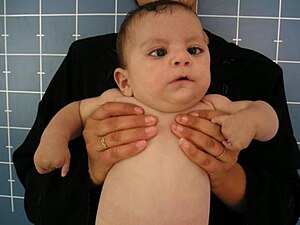Möbius syndrome
| Möbius syndrome | |
|---|---|
 |
|
| A child with oromandibular-limb hypogenesis-Möbius syndrome. Notice the expressionless face (due to bilateral VII nerve palsies) and missing fingers. | |
| Classification and external resources | |
| Specialty | medical genetics |
| ICD-10 | Q87.0 |
| ICD-9-CM | 352.6 |
| OMIM | 157900 |
| DiseasesDB | 31978 |
| eMedicine | neuro/612 |
| Patient UK | Möbius syndrome |
| MeSH | D020331 |
Möbius syndrome (also spelled Moebius) is an extremely rare congenital neurological disorder which is characterized by facial paralysis and the inability to move the eyes from side to side. Most people with Möbius syndrome are born with complete facial paralysis and cannot close their eyes or form facial expressions. Limb and chest wall abnormalities sometimes occur with the syndrome. People with Möbius syndrome have normal intelligence, although their lack of facial expression is sometimes incorrectly taken to be due to dullness or unfriendliness. It is named for Paul Julius Möbius, a neurologist who first described the syndrome in 1888.
People with Möbius syndrome are born with facial paralysis and the inability to move their eyes laterally. Often, the upper lip is retracted due to muscle shrinkage. Occasionally, the cranial nerves V and VIII are affected. If cranial nerve VIII is affected, the person experiences hearing loss.
Other symptoms that sometimes occur with Möbius syndrome are:
Children with Möbius syndrome may have delayed speech because of paralysis of muscles that move the lips, soft palate, and tongue root. However, with speech therapy, most people with Möbius syndrome can develop understandable speech. Möbius syndrome has been associated with increased occurrence of the symptoms of autism. However, some children with Möbius syndrome are mistakenly labeled as intellectually disabled or autistic because of their expressionless faces, strabismus, and frequent drooling.
Möbius syndrome results from the underdevelopment of the VI and VII cranial nerves. The VI cranial nerve controls lateral eye movement, and the VII cranial nerve controls facial expression.
The causes of Möbius syndrome are poorly understood. Möbius syndrome is thought to result from a vascular disruption (temporary loss of bloodflow) in the brain during prenatal development. There could be many reasons that a vascular disruption leading to Möbius syndrome might occur. Most cases do not appear to be genetic. However, genetic links have been found in a few families. Some maternal trauma may result in impaired or interrupted blood flow (ischemia) or lack of oxygen (hypoxia) to a developing fetus. Some cases are associated with reciprocal translocation between chromosomes or maternal illness. In the majority of cases of Möbius syndrome in which autosomal dominant inheritance is suspected, sixth and seventh cranial nerve paralysis (palsy) occurs without associated limb abnormalities.
...
Wikipedia
